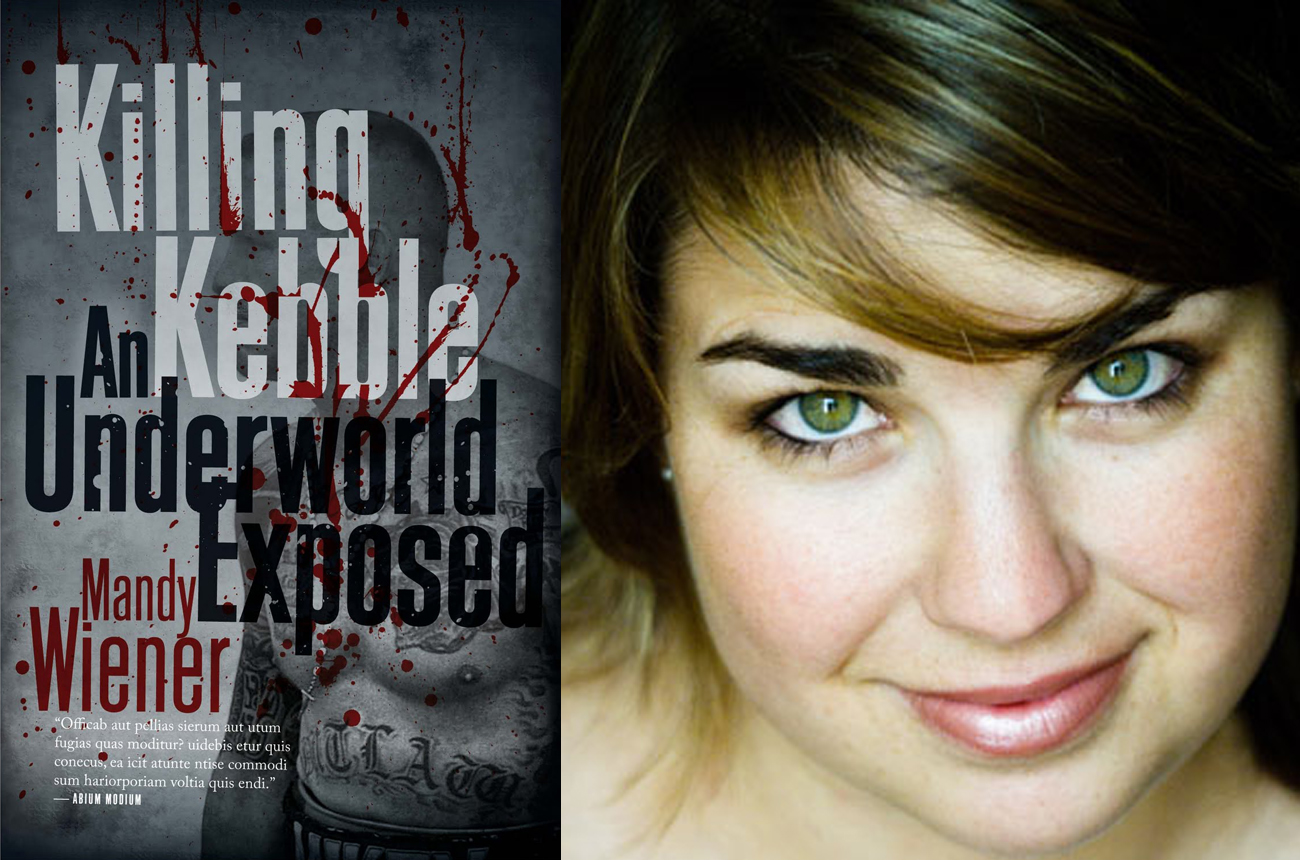The seven bullets that ripped into Brett Kebble on a September night in 2005 didn’t only end his life, but blew open a portal into the South African underworld and the complex crime webs that underpin our country. “What the book does is shine a glaring spotlight on one corner of the local underworld, but the crime is far more endemic, it is far more widespread,” says a fresh-faced Mandy Wiener, promoting her gritty account of the Kebble murder, which ultimately ended the career of SA police chief and Interpol boss Jackie Selebi. “I think there is extreme corruption of which we are not aware. Everything else is bubbling all over the place. I always say the Brett Kebble murder was this weak point in the organised crime syndicates’ operations. It is that one instance that exposed everything else. They were running these drug operations, they had the police commissioner on the take and then Kebble died and this blew it all up.”
It is synchronistic, if not fortuitous, that Wiener’s book was launched shortly after the death of Cyril Beeka, once again exposing a part of SA’s underworld with its drug lords, crime networks and links to Eastern European syndicates. “The same thing happened with Beeka,” says Wiener. “Everything was bubbling under the surface. You had this relationship between Radovan Krejcir, Richard Mdluli and Joey Mabasa and then Beeka died and it gets thrown in the public domain. The same with Lolly Jackson. If Lolly Jackson hadn’t have been killed, we probably wouldn’t have known that much about Radovan Krejcir and his relationship with senior police officers. It takes one instance to expose something far more fetid.”
Wiener says the Beeka hit and Krejcir’s legal travails have fuelled interest in her book which flew off local shelves to become an instant bestseller. The first print run of 10,000 sold out in four days and CNA has positioned ‘Killing Kebble’ on its higher shelves at the No 1 spot. Not too shabby for a 28-year old who cut her teeth in journalism with the corrupt mining magnate’s demise. “I spent five years on the Brett Kebble murder, and as the story evolved, I evolved. I grew in confidence, I cultivated sources.”
Wiener’s first job at Talk Radio 702 was writing traffic reports for Harry Sideropoulos and Aki Anastasiou. “I used to screen calls overnight, which is a life experience in itself because you meet some really interesting people. I then just begged Katy Katopodis for a job.” Thanks to Katopodis the former RAU (now called UJ) student moved into journalism and her big break came shortly thereafter, on the night that Kebble died.
“I started doing the Brett Kebble story when he died. I had never met him before and I had never covered him in a story. I was a cub reporter when he died, and I literally covered the story from the day he died. I always knew Kebble was controversial, that he was a businessman, that he was high profile, but I didn’t know enough about him. However, when I got the phone call to say he had died, I immediately bristled. I knew it was a big news story, but never knew the extent to which it would develop.”
Watch the Trailer for Mandy Wiener’s “Killing Kebble”:
And, boy, did the story develop. In many ways it went way beyond anything even the best crime novelist’s imagination could have cooked up. “When it first happened there was a lot of intrigue about what had happened. Whether it was a diamond deal gone wrong, or whether it was a suicide. David Klatzow came out very early on to say he thought it was an assisted suicide. We even heard there were Russian hit men involved, and there were all these convoluted theories about what was going on. It was only when the Mail & Guardian started putting things together and the Paparas drug bust happened that the finer details started to emerge and we began to realise how deep this thing went. How big it really was.”
Wiener’s ability to capture the complexity of this story is compelling, but what’s even more gripping is the unfettered access she has had to the key players in this drama and those with an inside view of Kebble’s life. Because of this you get dramatic insights like the relationships Kebble enjoyed with ANC cadres like Lunga Ncwana and Fikile Mbalula.
Ncwana is the man said to owe Kebble’s estate some R14 million, and who, despite this debt, late last year bought a football club, but not before telling the trustees of Kebble’s estate to “fuck off”.
Mbalula is, of course, our minister of sports and recreation, which is a good portfolio for him given the insights “Killing Kebble” offers. In the book Kebble’s butler, Andrew Minaar, says Mbalula was a regular visitor to the Kebble home. “He’d come here and in like an hour he’d finished off a bottle of Johnny Walker Blue Label. Flat. Flat.” Minaar reveals that Kebble’s ANC friends behaved like children in Kebble’s house, banging on the piano, laughing and always on the hunt for food or champagne. “They used to refer to Fikile as a ‘coconut’ and he really had a problem with that.” The book corroborates this view with a quote from Kebble's former personal assistant, Laura Sham: “They’d behave like they’d never seen anything. They’d be fine when they arrived, but the more they drank, they’d become hooligans. I knew Fikile drank quite a bit. They behaved like absolute hooligans.”
Equally fascinating is the voice of Mikey Schultz, who with Nigel McGurk and Fiazal “Kappie” Smith, killed Kebble and tell Wiener all about the events leading up to the murder. “I always had this idea that I had a book in me, but it was only once I had gotten Mikey, Nigel and Kappie on my side and convinced them to speak to me that I had the makings of a book. But it was a gamble because they still needed to sign their indemnities, I had done all the interviews with them on the basis that I could only use these once the indemnities had been granted.” The trio were granted indemnity in terms of section 204 of the Criminal Procedure Act, which came as a shock to those following the Kebble trial.
“Mikey, Nigel and Kappie had been dealt with very superficially in the media and the reason I wanted to establish a relationship with them is because I knew they had a story, and I see myself as a story teller. I don’t empathise with any of them in the book, all I see is a collection of versions about what happened. Their version of what happened, Agliotti’s, Selebi’s… the full spectrum.”
Wiener says when getting close to the three killers she calls “bungling assassins” there were overtures of friendship from their side and, because of this, she says she had to maintain firm boundaries. “I said to them from the beginning that if I am going to write this book, it is going to be my account of what happened from a journalistic perspective and it is going to be objective and fair and honest. To build relationships with people like this you have to have humility. You have to be able to sit down with them without judging them, and that is why they sat down with me. I never judged them, I never went up to them and said: ‘How could you have killed this man?’ I wanted to hear their stories. I am a storyteller and I think that everybody has a story to tell. I think they appreciated the fact that I didn’t vilify them. I think that is why they trusted me.”
Wiener describes the killers as polite and well-mannered. “When I walk into a room they will all stand up. Kappie will take his hat off and greet me saying: ‘Hello Ms Wiener’. There is a mutual respect, I think, more than anything else. They had to trust me and that goes entirely against their creed and their ethos. They have a code that dictates you don’t speak to journalists and you don’t speak to law enforcement authorities, but these guys had to do both. At the same time I am fully conscious of what they did. That they committed heinous crimes and they are killers.”
What’s interesting is the way Mikey, Nigel and Kappie view themselves. “They acknowledge they have done bad things, but they don’t describe it as evil. For them it was just another job and they don’t have any remorse. They have remorse about the way it turned out, but to them Brett Kebble was just some guy who wanted to die and they helped him out.”
The drama of the book, of course, includes Glen Agliotti, whom Wiener says feels he had the rawest of deals. “The truth is he was kept under house arrest for five years simply to leverage complicity against the national police commissioner. He got a raw deal and I will not be surprised if he sues the state for millions because he had limited movement. He couldn’t go anywhere. His business suffered. He’s very embittered and furious about the way the Scorpions treated him. At the same time many would argue he got away with murder. He slipped through this crack between the Scorpions and the police, and the acrimonious relationship between these two arms of government.” That’s another absorbing element about the book. It chronicles the death throes of SA’s famed Scorpions who were scrambling to survive while the police were doing their damndest to protect Selebi and realise the end of the organised crime fighting investigative unit.
Written in four months, “Killing Kebble” is an amazing feat for a journalist of Wiener’s age and experience. Wiener says more young journalists should be writing books. She’s right, of course, but the bigger truth is that more great journalists like Wiener should be writing books exposing South Africa’s underbelly regardless of their age. DM
Read more:
- An exposé that reads like a crime novel in Business Day,
- Kebble 'mentored' Mbalula in Mail & Guardian,
- It's murder out there in Mail & Guardian,
- Murder, money and mourning … by Mandy Wiener on IOL.





